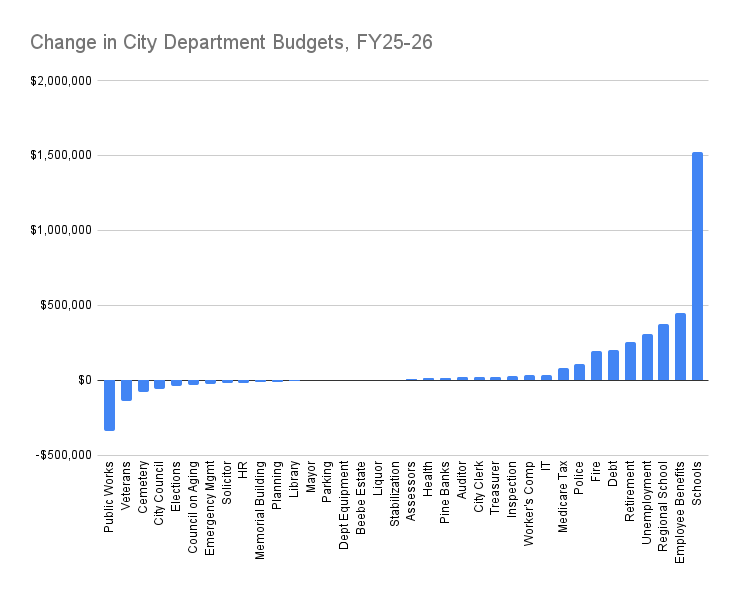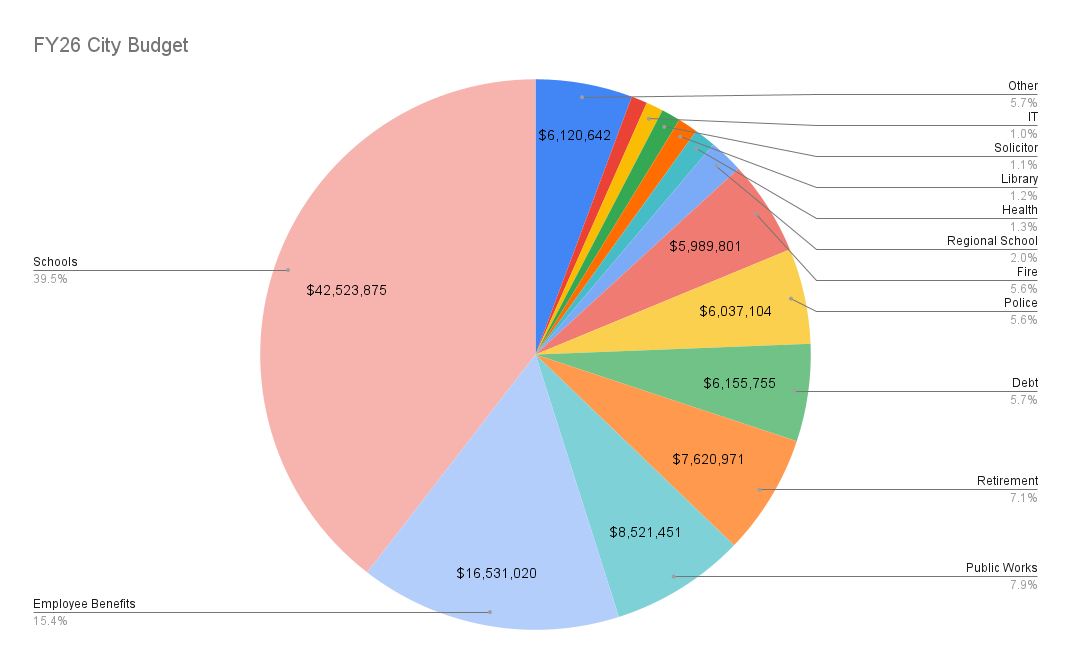City Council Begins Budget Process
By Ellen Putnam

Mayor Jen Grigoraitis addressing the City Council and School Committee
Screenshot from MMTV
On Monday evening, the City Council began their role in the process of approving the city’s budget for Fiscal Year 2026 (FY26), which begins in July.
Mayor Jen Grigoraitis kicked off the process by addressing a joint session of the City Council and School Committee to outline her proposal for next year's budget, which will be $107.5 million in total.
Starting on Thursday, the Appropriations and Oversight Committee of the City Council will meet twice a week to hear from and approve, reject, or reduce the proposed budget for each city department, until the City Council votes on the budget as a whole at the end of May.
The School Committee completed their own budget process at the end of April, voting on a $47.6 million budget for the Melrose Public Schools (including $42.2 million from the city budget and $5.4 million in offsets, or fees that the school district charges). Rising costs in a number of areas that outpaced revenue resulted in $4 million of cuts to the schools for FY26, including the elimination of 31 teacher positions and four administrator positions.
The city now faces $2.1 million in cuts to the non-school portion of the budget, and Mayor Grigoraitis’ address provided an overview of the budget that her department heads will present to the City Council in more detail in the coming weeks.
“This is a survival budget,” said Grigoraitis. “It is balanced, but it is not moving us forward. At best, we are treading water and trying to keep from being submerged.”

Change in city department budgets between FY25 and FY26 budgets
The proposed budget will eliminate 21 positions from city departments which, Grigoraitis noted, along with the three positions that were eliminated for FY25, will result in a reduction of 10% of city staff over two years. These reductions will be done through a combination of retirements, not filling open positions, and layoffs.
The positions eliminated will include five positions in the Department of Public Works (DPW); two positions in the police department; and positions at the library, the Solicitor’s Office; Emergency Management; Veterans Services; and in the City Clerk and Elections offices.
Last week, the city announced that they will move to using a private ambulance service, Armstrong Ambulance, which serves a number of neighboring cities and towns. The ambulance will be funded entirely from user fees, and will be based at fire headquarters on Main Street. As a result of this change, eight positions will also be eliminated at the Fire Department.
“Moving to a private service puts us in the company of nearly every community within I-95,” said Grigoraitis, and will reduce overtime costs within the Fire Department, which has previously struggled to staff the ambulance. This change may have cost-saving implications for the Public Safety Facilities Project, which involves rebuilding or renovating all three of Melrose’s fire stations.
Over 90% of city staff, including in the Melrose Public Schools, Fire Department, Police Department, and DPW, as well as many clerical workers at City Hall, are covered by union contracts, which means they receive contractual raises each year. Along with rising costs for health insurance and pensions, these contractual raises are among the main reasons the city’s costs are outpacing the revenue it is allowed to collect.
While none of the 60 non-union city employees - mostly department heads and managers, including the mayor herself - received any kind of raise or adjustment for cost-of-living, many departments needed to offset contractual raises for their unionized staff by eliminating positions.
Grigoraitis described some of the impacts residents will see from next year’s budget:
- The downtown flower basket program, which has previously been done in partnership with the Chamber of Commerce, will not happen this year
- Parklets will not be installed this spring
- In future years, the Chamber of Commerce will likely need to cover the cost of city support for closing down Main Street for events like the Victorian Fair
- The library will be closed on Sundays
- The DPW’s City Yard will have reduced hours and residents will need to purchase a sticker annually to use it
- Trash barrels and trash pickup will be reduced at public parks
- Road painting, sign replacement, sidewalk repairs, and field maintenance will be reduced
- Fees for Memorial Hall rental, Wyoming Cemetery, DPW disposal, building permits, liquor licenses, and other rentals are all expected to increase
“Our residents ask local government to deliver on their priorities,” said Grigoraitis, “but those priorities are not always the same. For many, it is frequently paved roads, or more resources for the schools. Others prioritize expanding community gardens or ensuring that well-loved traditions such as the Victorian Fair and new community events continue to happen, or the maintenance and expansion of veterans memorials, or that playing fields and parks are improved, or senior center programming expands, or bike lanes are added, or fees for school and city services and activities are reduced or eliminated.”
“But we do not have the sustained funds to deliver on all those priorities,” she continued, “which can mean that the dialogue amongst us and amongst the community becomes about ranking priorities, or worse, pitting them against one another. But we really need to get to a place where we can deliver. For everyone.”

Budget categories in the FY26 city budget
Last spring, Melrose voters rejected, 55% to 45%, a proposal for a $7.7 million property tax override that would have fully funded the city and school budgets for FY25. Mayor Grigoraitis has announced her intention to ask the City Council to include another override question or questions on the ballot for this November’s municipal election. She has convened a Financial Task Force to determine what that question or questions should be.
“I know many of you are watching what is happening in other communities, as so many are facing similar budget challenges,” said Grigoraitis. She noted that Milton successfully passed a $9.5 million override last week, while our neighbor, Stoneham, did not pass their proposed override and is now looking at eliminating or reducing library and senior center services in order to fund their budget shortfall. “We too will be faced with a similar choice in what path we want to take for our community next year,” Grigoriatis emphasized.
Grigoraitis also noted that Melrose is likely to be affected by funding changes at the state and federal levels. “I know we all hear from residents who are disheartened by our current national politics and would like it to have no place in local issues,” she said, “but we need to acknowledge that at this moment, national politics is very much present in our budget.”
In addition to the millions of dollars in direct federal aid that Melrose receives, including for special education and for upcoming climate resiliency projects, if federal funding for Medicaid or other state programs is cut, the state government could cut local aid, which is currently expected to be approximately $18.7 million for Melrose for next year.
“In light of our own financial outlook and the overwhelming likelihood of disruptions to state and federal funding, I want to be clear – there is no improving this budget,” said Grigoraitis. “It will not be impacted by a successful override later in 2025. The chance to ‘save’ FY26 was last June’s override. The public told us what they wanted to see, and we are delivering it to the best of our ability.”
After Mayor Grigoraitis’ address, the City Council moved on to free cash appropriations.
Free cash is essentially money that has not been used at the end of each fiscal year. The state’s Division of Local Services (DLS) recommends that cities and towns aim to generate free cash equal to five to seven percent of their annual budget, and that free cash use be restricted to one-time expenses, capital projects, and filling stabilization funds (which are essentially the city’s savings accounts for different purposes).
Last year, Mayor Grigoraitis budgeted a higher percentage of local receipts to fund the schools, which means that free cash going into FY27 will likely be significantly lower than it is this year. Due to budget cuts, a number of expenses that would have previously been a regular part of the city budget have been moved to free cash.
This year, the city has $5.8 million in free cash, of which the City Council has already voted to appropriate $4.8 million to 28 different projects, including:
- $839,712 to the Melrose Public Schools for various costs including technology replacement, diagnostic testing, and Medicaid reimbursement
- $235,000 to replace playgrounds at the Hoover and Lincoln Schools
- $250,000 for a feasibility study for roof repair projects at the Franklin and high schools
- $339,000 for repairs to the Franklin School
- $100,000 for asbestos remediation projects
- $250,000 for the snow and ice deficit
- $120,000 for the DPW’s summer work program
- $50,000 for sidewalk repairs
- $25,000 for a stormwater enterprise fund study
- $80,000 for stormwater improvements at Ell Pond Park
- $175,000 for the Lebanon and Sylvan stormwater project
- $75,000 for traffic improvements at West Foster and Vinton
- $8,000 for flower planting at veterans memorials
- $48,000 for improvements to the dog park
- $980,000 to the Fire Department for overtime and equipment costs
- $16,000 to the Police Department for evidence software
- $100,000 to replace a Council on Aging van
- $20,000 to Human Resources for physicals and advertising
- $20,000 to the Melrose Cultural Council
- $250,000 to the Special Education Stabilization Fund
- $750,000 to the Capital Stabilization Fund
The City Council voted against the $2,000 the mayor proposed for next year’s inauguration ceremony, with members expressing that they could skip the formal ceremony at Memorial Hall and hold a simple ceremony in the City Council Chambers for free.

City Council President Leila Migliorelli at Monday's meeting
Screenshot from MMTV
The City Council is still deliberating on $90,000 for a new police cruiser, with members trying to determine whether the vehicle would be “a need to have, or a nice to have.”
The most controversial topic of the evening turned out to be a proposed $68,000 appropriation for tree planting, which the DPW largely uses to replace trees on public property that have been removed. James Horne of the Melrose Tree Project spoke during public comment about the value of trees to the community, to the environment, and to property values.
Several City Council members expressed that they value trees, but were concerned about spending $68,000 in a tight budget.
At last Thursday night’s Appropriations Committee meeting, the item was recommended for passage by an unusually narrow margin of seven to four. However, the absence on Monday night of Ward 2 Councilor John Obremski, who had supported the item in the committee meeting, appeared to put the tree planting item in jeopardy. Ultimately, the City Council voted to reduce the free cash expenditure by half, to $34,000, and it was approved unanimously.
The mayor intends to roll over approximately $500,000 of this year's free cash into next year, in accordance with DLS recommendations, leaving an additional $500,000 remaining in free cash that she may ask the City Council to appropriate between now and the start of FY26 on July 1st.
On Thursday, the Appropriations Committee of the City Council will begin their budget hearings with presentations from several departments. Agendas for each meeting can be found here, and anyone can speak during public comment at the beginning of each meeting.

Follow Us: